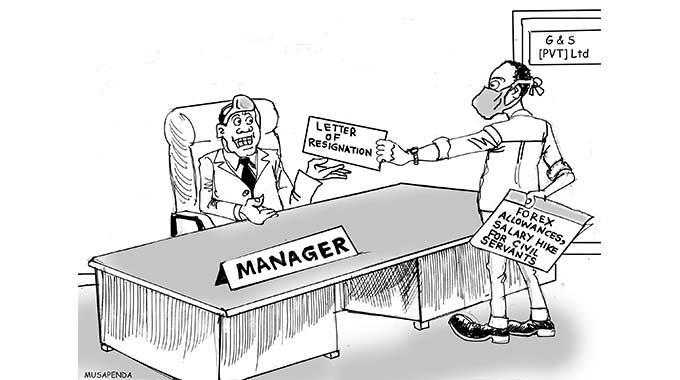COMMENT: Private sector must follow Govt lead on forex allowances

Life is difficult for workers, most of whom are paid in local currency.
The salaries aren’t buying much on our US$-craving market. Any customer who walks into a shop these days to ask the price of any commodity is sure to be told the US$ price first, only to be given the local currency price on further inquiry as if the US$ is the official currency in the country and the Z$ the foreign currency. Basically all businesses in the informal sector no longer accept payment in local currency but the US$ and the South African rand. This is problematic for the worker who earns their salary in local currency.
To be able to get by workers just need to be paid in US dollar.
As it announced on Wednesday, the Government will start paying its workers a US$75 tax-free allowance across the board while pensioners who retired from the civil service will be paid US$30 monthly. On top of the allowance, the Government increased civil servants’ salaries by 50 percent.
Announcing the intervention, the Ministry of Finance and Economic Development said in a statement that the Government was committed to paying a living wage to its employees while at the same time ensuring sustainability of the budget.
“Pursuant to Government’s commitment to continuously review and improve the remuneration framework for civil servants, taking into account the transitory economic challenges being currently experienced in the country, which have been exacerbated by the Covid-19 pandemic, Government makes the following announcement: with immediate effect, all civil servants’ salaries will be adjusted upwards by 50 percent,” read the statement.
“In addition, all civil servants will be paid a flat, non-taxable Covid-19 allowance of US$75 per month. Government pensioners will be paid a flat, non-taxable Covid-19 allowance of US$30 per month.”
We understand that Government employees and pensioners actually want their salaries and allowances to be paid in foreign currency but this interim package must bring relief to them amid increasing prices of all goods and services and business preference to foreign currencies.
Yes, the relief will be for the next three months to assist civil servants and former civil servants against the Covid-19-induced economic hardships but we are of the view that the Government must consider extending it as long as the economic challenges persist.
The 50 percent salary increase for civil servants will be helpful too in further boosting their spending power.
The lowest paid Government employee earns about $3 000 before deductions with nurses earning around $4 000. In the private sector, the lowest paid worker is around $3 000 as well with a few reaching $10 000 per month.
However, salaries for most civil servants and a good number of workers in the private sector are far below the breadline which, according to the Consumer Council of Zimbabwe (CCZ), was $8 725 last month, up from $4 378 in January.
CCZ said recently that a family of six now required $5 551 for groceries a month while a further $2 666 is required for other basics such as housing, transport, health and clothing.
This means that most Government employees and many employees in the private sector were unable to afford basics at their June salaries which is regrettable.
Given that many private sector wages aren’t really any better, this step by the Government must challenge the private business to begin paying their workers in foreign currency as well. We interviewed bosses at the Employers’ Confederation of Zimbabwe, Confederation of Zimbabwe Industries and Zimbabwe National Chamber of Commerce yesterday. They all backed the Government’s move as we report on our front page today.
A few months ago, the Government permitted them to charge for their goods and services in foreign currency, of course alongside local currency. Furthermore, a few days ago, the Government reiterated that business can display their prices in local currency alongside the US$. This means that business has been earning foreign currency for some time, and they are set to earn more into the future as all civil servants will now earn the US$ allowance.
In view of these factors, we don’t see the private sector failing to emulate the Government in paying a portion of their workers’ wages in foreign currency. They can start small like the Government is doing, and consider improving the packages as time goes on.









Comments